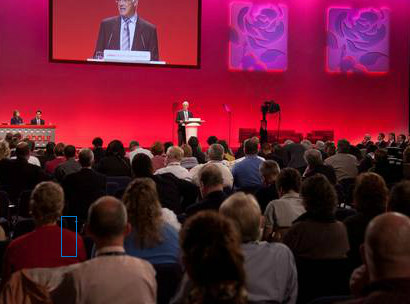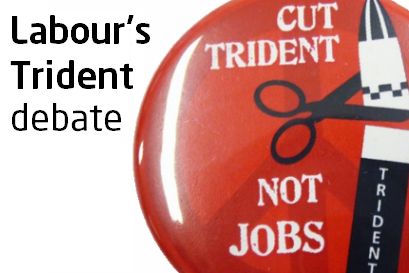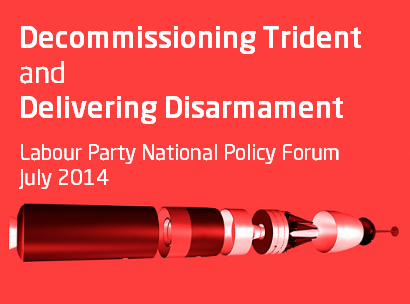 Labour PPCs say Scrap Trident
Labour PPCs say Scrap Trident
Labour’s prospective parliamentary candidates in the 2015 election are speaking out about their opposition to Trident.
The views of Labour candidates are being published on the CND website as part of an ongoing survey, with 75% expressing opposition to Trident replacement to date.
Below, we publish statements from a selection of those – more than 50 candidates standing from Scotland down to Kent and Cornwall – who are campaigning for a Labour Government.
They want to see a Labour Government that delivers on disarmament of the UK’s nuclear weapons, as we are bound to under the Non-Proliferation Treaty.
Labour CND encourages Labour candidates to express their opposition to Trident.
Labour CND will publish statements as we become aware of them.
This is not an exhaustive list – more may be found published from CND’s election survey.
If you are a Labour PPC and wish to add your own statement to this page, please email info@labourcnd.org.uk.

Name: Diane ABBOTT
Constituency: Hackney North and Stoke Newington
I have supported the Campaign for Nuclear Disarmament all my political life. And I think the case for it has never been stronger. Nuclear weapons were twentieth century weapons devised for the Cold War, when the big threat was the USSR and its land armies. They cannot possibly keep us safe in the twenty first century when the real threat is international terrorism. In any case they are not a genuinely independent deterrent, because we could not use them without the agreement of the United States. Furthermore it is unbelievable to me that, when the welfare state is being slashed because apparently cannot afford it, anyone is suggesting spending twenty billion on a weapons system that cannot keep us safe and we will never use. So I am opposed to the replacement of Trident.
 Name: George AYLETT
Name: George AYLETT
Constituency: South West Wiltshire
In the United Kingdom, 13 million people live below the poverty line. We supposedly do not have the money to lift these people out of poverty but can afford an £100 billion replacement for Trident? This is iniquitous. That money should be spent on raising the standard of living for those at the bottom, to support our public services and to fund our NHS. I will oppose the replacement for Trident if elected as an MP.
 Name: Jane BASHAM
Name: Jane BASHAM
Constituency: Suffolk Central
I remember being haunted by the images of death and destruction in Nagasaki and Hiroshima in my history books at school. I couldn’t quite believe that anyone could have given the command for that to happen. I found the courage and protest of the women of Greenham Common inspiring, and I am worried that we have forgotten the threat that nuclear war presents. Nuclear weapons are the ultimate in inhumanity – in direct conflict with my Labour Party values. By scrapping Trident we would be showing the moral leadership this world needs.
 Name: Barry BLACK
Name: Barry BLACK
Constituency: Aberdeenshire West and Kincardine
I began campaigning against Trident through local groups when I was 14. I was not only won over by the moral argument against these warheads but the financial one too. Heavy cuts through our local authorities meant young people were facing the brunt of services being axed, while at the same time billions was being poured into Trident. It didn’t make sense. The threat of the Cold War makes it easy to see why such scandalous amounts of money were approved to be spent, but now it is a useless relic. It is not fit to meet the threats we face. I would vote to scrap Trident and I support an international Nuclear Weapons Convention.
 Name: Lesley BRENNAN
Name: Lesley BRENNAN
Constituency: Dundee East
Children, in Dundee, are not experiencing the same quality of education as those that are a wee bit older did. Dundee City Council has cut teachers and learning assistants to “meet the budget”. Society only has one chance to get it right for every child. Working as an economist, I forecast and analyse the short and long term impacts of decisions, and the best budget allocations. However, you don’t need to be an economist to know that the UK should not invest in a killing system over our kids’ future. I will not support the renewal of Trident.
 Name: Matthew BROWN
Name: Matthew BROWN
Constituency: Louth and Horncastle
In a modern, globalised world conflicts are no longer between nations. Terrorist groups have no borders and are associated to no one nation. It is because of this new threat to our security that I remain to be convinced that replacing Trident is appropriate to ensure our nation remains secure.
 Name: Richard BURGON
Name: Richard BURGON
Constituency: Leeds East
Nuclear weapons pose a threat to the whole of humanity. For the sake of the whole of humanity and for the sake of generations still to come, we need to achieve a world free from nuclear weapons. I oppose the replacement of Trident and support a global ban on nuclear weapons. Opposing the replacement of Trident is not only right as part of a practical strategy to create a safer world – it will also save the UK Government £100 billion, which should be spent on hospitals, schools and job creation.
 Name: Edward CARLSSON BROWNE
Name: Edward CARLSSON BROWNE
Constituency: Harwich and North Essex
I’m opposed to the renewal of Trident, on both and practical moral grounds. Any use of nuclear weapons is going to lead to the loss of innocent life, both from the initial explosion and from the fallout. So a first strike nuclear attack is an abhorrent prospect and even in retaliation, I don’t see how killing non-combatants in one of the most horrifying ways humanity has devised is an appropriate response.
 Name: Katy CLARK
Name: Katy CLARK
Constituency: North Ayrshire and Arran
I do not believe that Trident can be justifiable due to its destructive potential. I am extremely concerned about nuclear proliferation. I also believe that in a time of austerity the money spent on Trident could be much better used elsewhere. Given the catastrophic implications of a nuclear strike it is essential that we do everything possible to prevent this from occurring. A nuclear weapons convention would be a sensible step that could be taken to reduce the likelihood of such a strike. I voted against the renewal of Trident in 2007 and have consistently spoken out and campaigned against Trident as an MP.
 Name: John CLARKE
Name: John CLARKE
Constituency: Witham
I was a part-time member of the Reserve Armed forces for 16 years and my own personal views on the use of nuclear weapons have changed dramatically, several times, in the last 30 years. As a Reservist during the Cold War I was unquestioning in my acceptance of the nuclear option but as events unfolded and the Berlin Wall fell, nuclear arms began to appear to be a bit of an irrelevance.
 Name: Anna CODA
Name: Anna CODA
Constituency: Hereford and South Herefordshire
I am opposed to the proposed replacement of the Trident missile system which is based on an outdated military strategy, is contrary to efforts to promote nuclear disarmament and will consume vast financial resources that could be better applied to other defence requirements, employing more nurses and teachers, developing renewable energy, building houses or scrapping tuition fees.
 Name: Michael CONNARTY
Name: Michael CONNARTY
Constituency: Linlithgow and Falkirk East
I have opposed the UK’s possession of Nuclear weapons since it was Polaris. It is completely illogical and immoral to build and deploy weapons of mass destruction. With the end of the Cold War it is now even more illogical to renew or replace the Trident nuclear weapon system.
 Name: Chris CONNIFF
Name: Chris CONNIFF
Constituency: Ross, Skye and Lochaber
I believe in unilateral nuclear disarmament, we need to lead the way in getting rid of abhorrent weapons of mass destruction. We should invest the money in equipping our armed services so that they can be an effective worldwide humanitarian response to conflict. I would also invest in equipping and manning our intelligence services to deal with the rising threat from terrorism.
 Name: Sally COPLEY
Name: Sally COPLEY
Constituency: Oxford West & Abingdon
I would vote to scrap Trident. Through my work (in the international development sector), I was a part of the campaign which finally brought us the Arms Trade Treaty last year and would absolutely support any moves which bring about a similar nuclear weapons convention. I cannot see that Trident represents a good use of £100bn.
 Name: Jeremy CORBYN
Name: Jeremy CORBYN
Constituency: Islington North
I have been a CND activist since I was a teenager and have recently attended anti-Trident protests at the Ministry of Defence, as well as putting questions to the Defence Secretary in the Commons as CND’s Vice-Chair. I will vote against Trident replacement – as I did in 2007 – if elected again and urge the government to show support for a nuclear weapons convention, or global ban on nuclear weapons, and to set out a new foreign policy based on peace and global justice, not war and intervention.
 Name: Ian DAVIDSON
Name: Ian DAVIDSON
Constituency: South West Glasgow
In the last House of Commons vote on the renewal of Trident on 14th March 2007, I was present and voted no. It would be my intention to vote against the renewal of Trident on any future occasion when a decision is to be taken. I strongly believe not only that Trident should not be renewed, but that the whole UK nuclear weapons system should be scrapped at the next Strategic Defence and Security Review and would work to make this case in Parliament if re-elected. Nuclear weapons are incapable of addressing the threats we face today and will face in the future. They are a relic of the Cold War. The best way of securing a safer world is worldwide disarmament. With nuclear weapons capable of causing at least as much destruction and loss of life as chemical and biological weapons, it is only right that a convention or ban on these should be sought as well. Labour believes in worldwide nuclear disarmament and, if elected in May, intends to use the NPT Treaty meeting this year to advance.
 Name: Braden DAVY
Name: Braden DAVY
Constituency: Gordon
I would vote for the scrapping of Trident, the money could be put to better use elsewhere.
 Name: Jim DEEN
Name: Jim DEEN
Constituency: Worthing West
I am opposed to Trident renewal.
 Name: Andrew DISMORE
Name: Andrew DISMORE
Constituency: Hendon
In the early 1980s, I was chair of Labour CND. My view is that as Trident comes to the end of its life it should be allowed quietly to wither away and not be replaced.
 Name: David DREW
Name: David DREW
Constituency: Stroud
I support the aims of Labour CND. I oppose Trident and will do what I can to advance the cause of nuclear disarmament.
 Name: Malcolm FINCKEN
Name: Malcolm FINCKEN
Constituency: Braintree
The Trident nuclear weapon system and its proposed replacement do not make Britain safer. The money would be better spent on improving the UK’s conventional defences and on the NHS and other public services.
 Name: Vicky FOXCROFT
Name: Vicky FOXCROFT
Constituency: Lewisham Deptford
I am not in favour of replacing Trident and I believe we could invest the money spent on trident in more high technology environmentally friendly jobs. Investing in green jobs for the future. I hope that this encapsulates my position.
 Name: Roger GODSIFF
Name: Roger GODSIFF
Constituency: Birmingham Hall Green
Renewing Trident is dangerous, counter-productive and a waste of resources. Committing £100 billion to renew our nuclear deterrent is ridiculous at a time of austerity when so many of our services, including conventional defence forces, are being slashed. This is why I voted against Trident in the January debate in Parliament, and I will continue to oppose nuclear weapons. Nuclear proliferation with increasing powers of destruction will not make our world safer, and the route to non-proliferation is not to buy more weapons while expecting the rest of the world to do the opposite.
 Name: John GROGAN
Name: John GROGAN
Constituency: Keighley
On Trident I agree with those senior voices from the military who argue that the renewal of Trident is not justifiable in terms of military strategy and will distort our entirely military budget. I shall not be supporting the renewal of Trident. I think the defence review should of course consider non nuclear defence strategies. The British Government should also take a lead in the disarmament talks whose ultimate goal is to rid the world of nuclear weapons.
 Name: Louise HAIGH
Name: Louise HAIGH
Constituency: Sheffield Heeley
I’ve been a supporter of CND for a number of years, of course I’d want to see jobs protected by investment in other industries but I believe investment in nuclear is immoral in and of itself and in our current economic climate a dire waste of public resources. Labour has a proud history of promoting multilateral disarmament but in an increasingly complex and interconnected world, Trident represents an outdated solution and it is clear that unilateral disarmament is necessary.
 Name: Patrick HALL
Name: Patrick HALL
Constituency: Bedford
It is really a no-brainer. The cost – in all senses of the word – is too great. We should not pay it. We should not meet it. We should not renew Trident.
 Name: Fabian HAMILTON
Name: Fabian HAMILTON
Constituency: Leeds North East
The next government can not afford to replace Trident at a cost of £100 billion. I would support a nuclear weapons convention or ban, similar to those for chemical or biological weapons and vote to scrap Trident rather than replace it with a new system.
 Name: Kelvin HOPKINS
Name: Kelvin HOPKINS
Constituency: Luton North
I am concerned at the continued threat of nuclear weapons and believe we need to achieve nuclear disarmament once and for all. I support a global ban on such weapons as part of our commitment to nuclear disarmament, as was successful with other weapons of mass destruction such as chemical and biological weapons. I will oppose the replacement of Trident if elected as an MP. This has been an important issue for me since I first entered Parliament in 1997 and will continue to campaign for nuclear disarmament.
 Name: Cathy JAMIESON
Name: Cathy JAMIESON
Constituency: Kilmarnock and Loudoun
I have been a member of CND for a number of years. I recognise that the previous Labour government played a significant role in reducing the number of nuclear weapons globally, and I want to see that built upon in the next Parliament. I believe that the UK has a major role to play in the global disarmament process, and that this is too serious an issue for political game playing. I have never taken the view that it is enough to have Trident removed from Scotland, but that we must look to the wider global responsibility to disarm. That means having the UK continue to be involved in global negotiations. However, for me, this is a first and foremost a moral issue, and I will therefore vote with my conscience, and vote against the renewal of Trident when the decision is put to Parliament.
 Name: Huw JONES
Name: Huw JONES
Constituency: South East Cambridgeshire
I would vote against Trident replacement; this would be a non-negotiable principle. I cannot support UK’s continued possession of weapons of mass destruction whether they are nuclear, chemical or biological.
 Name: David LAMMY
Name: David LAMMY
Constituency: Tottenham
The next government can not afford to replace Trident at a cost of £100 billion. I would support a nuclear weapons convention or ban, similar to those for chemical or biological weapons and vote to scrap Trident rather than replace it with a new system.
 Name: Hugh LANNING
Name: Hugh LANNING
Constituency: Canterbury
I cannot contemplate the circumstances in which we would use such a weapon of mass destruction. As a lifelong trade unionist I would wish the resources to be used to protect and develop public services. As an internationalist, interventionist wars have been a disaster for this country, we need to recognise that our proper role should be the promotion of peace.
 Name: Mark LAZAROWICZ
Name: Mark LAZAROWICZ
Constituency: Edinburgh North and Leith
I am opposed to the replacement of Trident. I have voted accordingly every time I have had an opportunity to vote on the issue in Parliament since I was first elected, and will continue to vote against Trident replacement if I am re-elected in May 2015.
 Name: Clive LEWIS
Name: Clive LEWIS
Constituency: Norwich South
Renewing Trident would be a monumental mistake our country and planet can ill afford. As we head into the 21st century the challenges facing our planet in terms of climate change, population growth and declining bio-diversity, will take an enormous share of humanity’s resources, ingenuity and collective ability to overcome. Such an existential challenge is simply incompatible with spending billions on nuclear weaponry. Instead the message we must send to both the rest of the world but especially the US and Russia, themselves on the brink of a new and destructive arms race, is that there is a different course possible. Non-renewal of trident offers us that chance. We can not and must not let it slip past. If Britain wants a global leadership role let it lead the by example not destructive capability.
 Name: John McDONNELL
Name: John McDONNELL
Constituency: Hayes and Harlington
When we are faced with such a huge deficit in our public finances, there is no better time to convince people that spending tens of billions of pounds on Trident just doesn’t stack up economically. As people waiton hospital trolleys in long queues at our A&E’s just think what we could do with that scale of public investment in our NHS. Scrapping Trident is a no brainer. That’s why I am arguing and campaigning for a non-nuclear future for our country.
 Name: Matthew MAHABADI
Name: Matthew MAHABADI
Constituency: South Holland and the Deepings
Morally, I am absolutely opposed to nuclear weapons. I think that they are a useless, self-defeating and nihilistic form of warfare and a permanent existential threat to humanity. Nuclear weapons are even more of an existential threat than biological and chemical weapons. It is about time they were classified in the same category. The West is a moral vanguard and we should be leading the way in moving to the post-nuclear age. It is a ridiculous waste of money. We would be much better off investing in a society that is happy, healthy and resilient to the undermining non-conventional enemy and foreign forces that are at play in the 21st century. We should also be re-prioritising our military investment into more effective forms of defense from the threats of cyber-terrorism and other ‘black hat’ attacks from enemies both foreign and terrorist, rather than throwing money at outmoded monoliths that are purely symbolic and based on practically ancient technology.
 Name: Rachael MASKELL
Name: Rachael MASKELL
Constituency: York Central
I believe that we need to secure labour diversification to ensure that no-one who currently works in the manufacturing sector lose their jobs with a move to end our nuclear industry. As a candidate, I believe that there should not be a replacement to our nuclear defense system. Labour will carry out a Strategic Defense and Security Review, and I believe that this should incorporate a review of Trident.
I do not believe that there is a case for Trident, and believe that we should be making alternative investments in defending our country, particularly in the light of the new forms of security threats, and therefore will be making the case that replacement of our nuclear weapons should not go ahead. I believe that the funding could be far better spent. On an international level, I believe that we should be looking to build new platforms for peace.
 Name: Graeme MORRICE
Name: Graeme MORRICE
Constituency: Livingston
I strongly support nuclear disarmament and a global ban on all nuclear weapons. It is wrong that billions of pounds is being earmarked for a replacement of the Trident nuclear weapons system when many ordinary people are struggling to meet the cost of living, and cuts in essential public services and benefits are adversely affecting those in greatest need. I oppose the replacement of Trident and will continue to oppose it if re-elected as an MP.
 Name: Grahame MORRIS
Name: Grahame MORRIS
Constituency: Easington
I want a safer world moving towards nuclear disarmament. Replacing Trident will undermine the UK’s moral authority when seeking to restrict nuclear proliferation by other countries. Nuclear weapon address the security concerns of the past and we must move beyond a cold war mentality. We must adapt to meet the new security challenges of the 21st Century, such as climate change, pandemics, organised crime, cyber warfare and terrorism. In a time of austerity when the Government are making damaging cuts to our armed forces as well as cutting public services back to the level of the 1930’s, we cannot justify spending in excess of £100 billion on a new Trident system that will do nothing to improve the security or defence of the UK.
 Name: Ian MURRAY
Name: Ian MURRAY
Constituency: Edinburgh South
I’ve made it clear that I wouldn’t support it Trident. I made it clear to my constituents in 2010 that I would not vote for the renewal of Trident and I’ve been saying that regularly.
 Name: Andy NEWMAN
Name: Andy NEWMAN
Constituency: Chippenham
I am totally convinced that Trident replacement is contrary to the UK’s national interest. The cost of £100bn is simply unaffordable, and these nuclear weapons are useless in addressing the changed national security landscape of the 21st century. There is no other state that represents a credible strategic nuclear threat to the UK, and therefore the role of these weapons as deterrence is obsolete. Britain should show moral leadership in embracing disarmament.
 Name: Scott NICHOLSON
Name: Scott NICHOLSON
Constituency: Perth and North Perthshire
Perhaps the most powerful argument for opposition to the replacement of the Trident nuclear weapons system would be on the grounds of cost, particularly at a time of continued government austerity. As a result, in the 2016 parliamentary vote, I would vote against replacing Trident.
 Name: Kate OSAMOR
Name: Kate OSAMOR
Constituency: Edmonton
The next government can not afford to replace Trident at a cost of £100 billion. I would support a nuclear weapons convention or ban, similar to those for chemical or biological weapons and vote to scrap Trident rather than replace it with a new system.
 Name: Sandra OSBORNE
Name: Sandra OSBORNE
Constituency: Ayr, Carrick and Cumnock
I have in the past voted against Trident replacement and I will continue to campaign against it. I am opposed to Trident replacement for a number of reasons and the cost of replacement would use up financial resources which in my view could be better spent in other areas. In the Strategic Defence and Security Review which the next Government will conduct I would support looking at the issue of Trident replacement within the context of that review. The nuclear non-proliferation treaty review conference in New York takes place in May 2015 which a new government would be expected to attend. I am supportive of multilateral discussions on nuclear weapons issues such as this conference. It would be a very positive development if the conference supported a nuclear weapons convention.
 Name: Nick PALMER
Name: Nick PALMER
Constituency: Broxtowe
The Strategic Defence and Security Review should scrap nuclear weapons rather than replace them with a new system – which would cost a barely affordable £100 billion at the expense of conventional defences and the overall budget. We should seek to use this decision as part of a broader international nuclear weapons treaty. The government should support a nuclear weapons convention or ban, similar to those for chemical or biological weapons.
 Name: Nancy PLATTS
Name: Nancy PLATTS
Constituency: Brighton Kemptown and Peacehaven
I have always opposed nuclear weapons on moral grounds and I cannot support the renewal of Trident, even more so given the vast level of expenditure required. Threats to UK security in recent years have highlighted how nuclear weapons are not relevant to today’s world and the threats that we face. At a time when people are struggling with the cost of living, when we have such a high level of child poverty and when people are sleeping on our streets, spending billions of pounds on cold war weaponry cannot be justified.
 Name: Kerry POLLARD
Name: Kerry POLLARD
Constituency: St Albans
As the Bishops outline so clearly the case for having a nuclear weapon is now outdated – a sentiment I totally agree with. The UK has the oldest democracy and most experience in diplomacy and should take a lead, through the UN, in actively promoting a nuclear weapon free world.
 Name: Charlynne PULLEN
Name: Charlynne PULLEN
Constituency: Mid-Bedfordshire
For me, and Labour more generally, those important issues revolve around having high quality public services, like the NHS; supporting people into employment where possible and staying in employment; enforcing government regulation on issues like the minimum wage; and a range of other issues that make people’s lives better and bring communities together. I don’t believe Trident sits within that, although that is a personal view. I don’t think it’s helpful to start with a budget and make things fit, I’d rather start with people and priorities, then work out how to pay for them. I don’t think government can justify keeping Trident in the context of massive public sector cuts, but I’m not sure government can justify keeping it anyway. I support the aims of CND and would call for the amount that is due to spent on the renewal of Trident, to instead be spent on public services. I do think that cancelling Trident would create a problem for advanced engineering in the UK, and that we should plan for this to ensure that advanced engineering continues to be an important part of the UK economy, with high quality and secure jobs. As we move beyond the cold war attitude to a nuclear deterrent, the international community should consider this an opportunity to revisit the need to maintain nuclear weapons.
 Name: Joe RICHES
Name: Joe RICHES
Constituency: York Outer
Opposed to Trident 100%.
 Name: Mike ROBB
Name: Mike ROBB
Constituency: Inverness, Nairn, Badenoch and Strathspey
I have been a supporter of nuclear disarmament for most of my adult and political life. I was actively involved in the campaign against Cruise Missiles in the 1980s and was a member of CND for most of the 1990s. I am now a member of Labour CND. I was a proud supporter of the Labour Party’s 1983 Manifesto with its firm commitment to removing nuclear weapons not just from the UK but from around the world. That’s not my party’s current stance. I have, however, chosen to stay in a party whose values and policies I support in many other areas and to continue the internal pressure to change our nuclear policy, especially on Trident. There are many within the Labour Party who share such views and we have had some success. The Labour Government between 1997 and 2010 made a considerable reduction in our nuclear arsenal from some 300 warheads to fewer than 160. And at our Party Conference last year, the agreement to include Trident in the coming strategic defence review if Labour is elected this year is a sign that we are continuing to make some progress.
 Name: Lee RUSHWORTH
Name: Lee RUSHWORTH
Constituency: Penrith and the Border
My first experience of politics was when I was 14 at a local CND meeting. While I have not been a member as an adult my view on nuclear weapons has not changed. Too much money is spent on the imagined threat from an eastern block that no longer exists.
 Name: Lloyd RUSSELL-MOYLE
Name: Lloyd RUSSELL-MOYLE
Constituency: Lewes and Seahaven
I believe that the contained threat of nuclear weapons makes us less safe and believe we need to achieve nuclear disarmament once and for all. I support a global ban on such weapons as part of our commitment to nuclear disarmament, as was successful with other weapons of mass destruction such as chemical and biological weapons. We can only lead the way by taking action ourselves, and in doing so investing money saved where it’s needed, making our country safer, richer and healthier. I’ve studied Peace and Conflict Studies and worked in former conflict areas, I know first hand that peace doesn’t come down the barrel of a Vanguard submarine. In 2006 I took part in a year long campaign against trident renewal in Faslane, where the weapons are serviced, and would do all I could in Parliament to support the campaign for nuclear disarmament.
 Name: Purna SEN
Name: Purna SEN
Constituency: Brighton Pavilion
My father joined the Aldermaston marches in the early 1960s and he introduced me to CND as a child. I grew up understanding the danger of nuclear weapons. The end of the cold war and the nature of modern conflicts confirm both their danger and irrelevance. Activists and brave governments have moved us away from other weapons of mass destruction. We now need a brave and forward looking government that will act to deliver a world free of nuclear weapons. I will continue to oppose these weapons as an MP, including Trident.
 Name: Andrew SMITH
Name: Andrew SMITH
Constituency: Oxford East
I categorically oppose nuclear weapons, have consistently voted against replacing Trident, and will go on voting against renewing Trident at every opportunity, which I hope will include in the next Parliament under the next Government. In the many years that I have been an MP for Oxford East, I have regularly met with local Campaign for Nuclear Disarmament activists, members, and supporters, and I have represented their strong and correct views, as well as my own concerns, both within my party and to the Government of the day.
 Name: Peter SMITH
Name: Peter SMITH
Constituency: South West Norfolk
I have been a member of CND all my adult life. Though the political and media focus is currently on other major threats to humanity, most notably climate change and global warming, cyberwarfare and terrorism, the threat from nuclear weapons has if anything increased. I strongly support a global ban on nuclear weapons, and I believe this to be an achievable, and urgent, goal. If elected as an MP I will oppose the replacement of Trident, which is a hugely expensive and militarily pointless vanity project.
 Name: Alex SOBEL
Name: Alex SOBEL
Constituency: Leeds North West
I believe in a Nuclear Free World and believe we should put our weapons up for decommissioning at an international convention, encouraging others to do the same. I do not believe it is enough for the UK to disarm alone and we should use our position and Labour’s willingness to disarm to encourage others to do so. The next Labour government will conduct a Strategic Defence and Security Review, and this should consider the possibilities and implications of scrapping and not replacing Trident. I believe that to be the minimum position. If elected as MP for Leeds NW, I would certainly be arguing for Trident decommissioning in that post-election review. When the next Labour government attends the nuclear Non-Proliferation Treaty Review Conference in New York, it will be supporting a nuclear weapons convention or ban, similar to those for chemical or biological weapons? That is exactly my own position.
 Name: Jo STEVENS
Name: Jo STEVENS
Constituency: Cardiff Central
I’m a firm believer that nuclear weapons are not a deterrent or a solution. I’ve been very clear on my position on Trident, which is that I don’t think we should replace it. One goes, we all go.
 Name: David STOKES
Name: David STOKES
Constituency: Bournemouth West
I simply believe that there is no place in this world for nuclear weapons. Even if you simply take the cost, they are just not worth it. I believe that nuclear weapons are simply no use. We should spend the money on more conventional weapons. It would help everyone if there was an outright ban.
 Name: Graham STRINGER
Name: Graham STRINGER
Constituency: Blackley and Broughton
I have consistently voted against the renewal of Trident and will continue to do so.
 Name: Michael TAYLOR
Name: Michael TAYLOR
Constituency: Hazel Grove
As a practising Christian I find the idea of nuclear weapons utterly abhorrent. I long for a day when the world is free of them. A strategic defence review is essential in order to assess the needs of our nation’s security, everything should be considered, our place in the world and what we as a country can afford. Yes, I think our government should pursue every option possible towards a ban on nuclear weapons and a move towards non-proliferation. It is an easy answer to say Trident can be cut so we can therefore cut the deficit and reverse austerity. But I do agree that a proper strategic defence review needs to factor in what the country can afford and how need to provide security for our people.
 Name: Chris VINCE
Name: Chris VINCE
Constituency: Chelmsford
If I was asked to vote on the renewal of Trident I would vote ‘no.’ Spending £100bn pounds of tax payers money on something that must never be used does not seem in the best interest of the British people and more specifically the residents of Chelmsford who I wish to serve.
 Name: Catherine WEST
Name: Catherine WEST
Constituency: Hornsey and Wood Green
We live in an increasingly complex world where, now, more than ever, peaceful solutions to conflict are urgently needed. We can no longer spend the large amounts of public money on expensive weaponry. Some progress has been made in recent years to dissuade world powers from resorting to the production of nuclear weapons. We have an opportunity now to highlight the progress that has been made towards negotiation and the use of politics and diplomacy in resolving conflict. However, I believe we need to achieve nuclear disarmament once and for all. I support a global ban on such weapons as part of our commitment to nuclear disarmament, as was successful with other weapons of mass destruction such as chemical and biological weapons. I will oppose the replacement of Trident if elected as an MP.
 Name: Julian WARE-LANE
Name: Julian WARE-LANE
Constituency: Southend West
To spend millions replacing something we have not used with something that we will never use looks like folly, and this is why we must look again at the wisdom of replacing Trident. In these times of austerity we really cannot afford to waste tax-payer money. Whilst accepting the need for the UK to be able to adequately defend itself we should be working towards a world that is free from weapons of mass destruction, especially nuclear weapons. I am concerned for my children and grandchild, and I wish for a more peaceful world. I support a global ban on such weapons as part of our commitment to nuclear disarmament, as was successful with other weapons of mass destruction such as chemical and biological weapons. Whilst we may never live in a world that is entirely free from conflict, we can hope for a world where mutually assured destruction is no longer a possibility.
 Name: Russell WHITING
Name: Russell WHITING
Constituency: Suffolk Coastal
There is no reason to maintain nuclear weapons, an outdated relic of a past we have left behind and a stain on our nation, both morally and economically. It is time to invest in jobs, health and education rather than weapons of mass destruction. Scrapping Trident will show global leadership in moving towards a world without the threat of millions of people being killed by these weapons. As soon as I was aware of the devastation these weapons would cause if used I have been opposed to them, and would not vote to renew Trident if I become an MP.
 Name: Ben WHITTINGHAM
Name: Ben WHITTINGHAM
Constituency: Wyre and Preston North
Replacing Trident would say a lot about Britain; it would tell the world that we consider ourselves worthy of holding in our national armoury a weapon system so powerful it could extinguish life on a scale never seen before. Using nuclear weapons would be so utterly destructive and indiscriminate that we already intend never to use them – so why have them? Instead, let’s focus our efforts at home on building a fairer, more equal society free from want because that, after all, is what will make life safer and easier for ordinary people here and elsewhere in the world.
 Name: Jan WILLIAMS
Name: Jan WILLIAMS
Constituency: Harrogate and Knaresborough
It relies on American technology, so it is hardly ‘independent’. It is a piece of equipment we cannot afford. It was put in when Cold War was at its height, for last umpteen years it has been facing the sea, it hasn’t helped us win the war in Afghanistan and Iraq. We need a public debate.
 Name: Daniel ZEICHNER
Name: Daniel ZEICHNER
Constituency: Cambridge
The world would be a much better place without nuclear weapons and we all want that. The question is how do we get there. This has been a long-running dispute and debate in the Labour Party over many years and my position is not quite the same as my party’s position. My view is spending all that money on renewing Trident isn’t a very sensible use of money and there are plenty of people in the defence community who appreciate that and understand that.
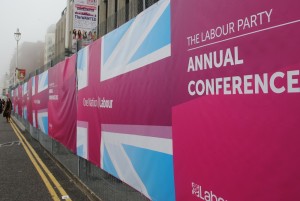 Resolution has been submitted by the Executive of Labour CND for consideration at Labour Party Conference in Brighton. It calls on Labour to support the scrapping of Trident, following comments from the Japanese Prime Minister at the Hiroshima commemorations.
Resolution has been submitted by the Executive of Labour CND for consideration at Labour Party Conference in Brighton. It calls on Labour to support the scrapping of Trident, following comments from the Japanese Prime Minister at the Hiroshima commemorations.
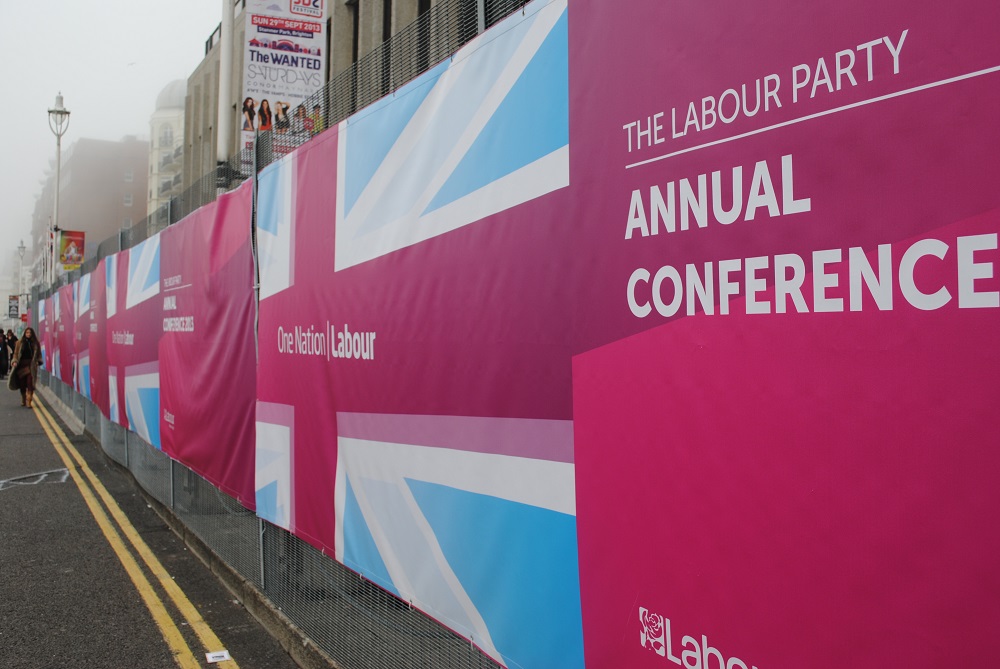


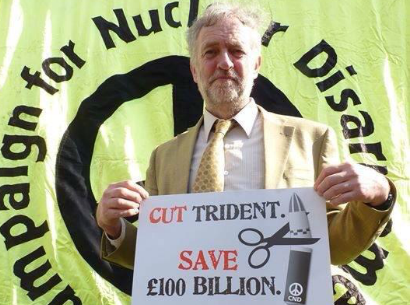
 During the nomination period for the Labour leadership election Labour CND wrote the following letter to Labour MPs urging them to nominate Jeremy Corbyn. We are delighted that the anti-Trident voice will now be heard in the leadership debates over the summer.
During the nomination period for the Labour leadership election Labour CND wrote the following letter to Labour MPs urging them to nominate Jeremy Corbyn. We are delighted that the anti-Trident voice will now be heard in the leadership debates over the summer.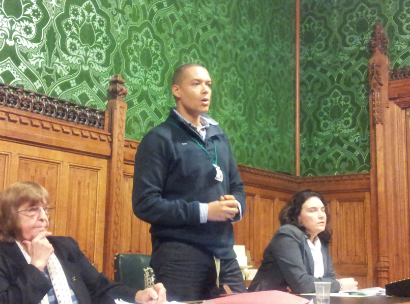


 Name: George AYLETT
Name: George AYLETT





































































